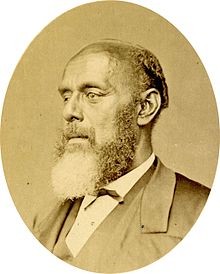Tēvita ʻUnga
| Tēvita ʻUnga | |||||
|---|---|---|---|---|---|
| Crown Prince of Tonga | |||||
 |
|||||
| Prime Minister of Tonga | |||||
| Term | 1 January 1876 – 18 December 1879 | ||||
| Successor | Shirley Waldemar Baker | ||||
| Monarch | George Tupou I | ||||
| Born | c. 1824 | ||||
| Died | 18 December 1879 (aged 54–55) Auckland, New Zealand |
||||
| Burial | 10 June 1880 Malaʻe Lahi, ʻUiha, Haʻapai |
||||
| Spouse | Fifita Vavaʻu Teisa Palu |
||||
| Issue |
Fusipala Taukiʻonetuku ʻUelingatoni Ngū Nalesoni Laifone |
||||
|
|||||
| House | House of Tupou | ||||
| Father | George Tupou I | ||||
| Mother | Kalolaine Fusimatalili | ||||
| Religion | Methodists | ||||
| Full name | |
|---|---|
| Tēvita (David) ʻUnga |
Tēvita ʻUnga (c. 1824 – 18 December 1879) was the first Crown Prince and Prime Minister of Tonga.
Born in circa 1824 to Tuʻi Haʻapai Tāufaʻāhau and one of his secondary wives, Kalolaine Fusimatalili, of the Fusitua line. His father Tāufaʻāhau later became King George Tupou I of a united Tonga. On 7 August 1831, Tupou was baptised into the Christian faith along with ʻUnga and his sibling. He was given the name Tēvita or David after the biblical King David. Following Tupou's marriage to Sālote Lupepauʻu in the Christian rite, he cast aside his secondary consorts and declared all his children by them illegitimate including ʻUnga. After his father moved to Tongatapu, he appointed ʻUnga as acting governor of Vavaʻu. In July 1865, English explorer Julius Brenchley visited Vavaʻu for five days and met governor ʻUnga, who he described:
The governor is a very tall, imposing-looking man, in spite of the loss of an eye, the result either of an accident or a wound in war. He was also minus two fingers, cut off as a tribute, according to the custom of these islands, to some deceased relatives. David has the reputation of being a great warrior, and a friend of civilization; he speaks a little English, provided there be no missionary within earshot. I found him dressed in a piece of tapa, which he told me he changed every three days, and which covered all his body with the exception of his legs and feet. He has a bed and some old furniture of European make; his flag, the same as his father's, is red, with a cross of the same colour on a white ground in the upper corner.
After the death of Queen Sālote Lupepauʻu's son Prince Vuna Takitakimālohi in 1862, Tupou I was left without an heir to the throne. As a result, ʻUnga was legitimised and named Crown Prince under the terms of the first written constitution of Tonga on 4 November 1875. ʻUnga was appointed the first Prime Minister of Tonga on 1 January 1876, a post he held until his death. In his lifetime, he also composed the words to "Ko e fasi ʻo e tuʻi ʻo e ʻOtu Tonga", which was adopted as the Tongan national anthem in 1874.
...
Wikipedia
